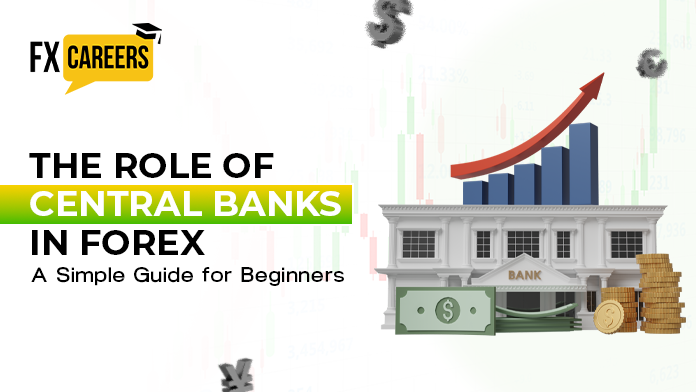FXCareers Blogs
 Go Back Home
Go Back Home

 08-09-2025
08-09-2025 5 minutes of Reading
5 minutes of Reading
The Psychology of Trading: How Mindset Impacts Your Forex Success
Every trader aims to make money, but most fail to do so. The real shocker isn't always a bad strategy, but a bad mindset. The fact is, trading psychology in forex is more important than people realise.
You can learn indicators, chart patterns, and technical setups, but without mental control, you will struggle. Fear will keep you from good entries. Greed will lead you to hold on to bad trades. Stress will cloud your judgment.
The consistent winners know one secret. They master themselves first. A solid mindset builds trading discipline and success.
Success in forex trading depends on your trading psychology. It's more important than any specific strategy or indicator. You must master your emotions. You should understand how your mindset affects your trading. Trading discipline is also essential. These are the keys to consistent profit and long-term growth. This article will explore a vital concept.
What Trading Psychology
To make money consistently and grow over time in forex trading, you need to control your emotions, understand your mindset, and develop a trading discipline.
Your Mental Operating System
Trading psychology is not about charts or strategies. It is about the thoughts and emotions that arise while you trade. Every click flows through your mindset.
When you feel calm, you act with confidence. When you feel anxious, you hesitate or exit too early. This proves how mindset affects forex trading — it shapes how you see opportunities and risks.
Why Mindset Matters More Than Method?
Two traders can use the same system and get different results. One stays consistent because of discipline. The other loses because he lacks control.
Discipline and success in trading are connected. Technical skills can help. But, psychology determines success.
The Emotional Rollercoaster of Trading
Trading brings strong emotions. These psychological factors in trading often decide whether you win or lose.
Fear: The Silent Account Killer
Fear prevents you from taking trades or causes you to cut winners too early. Worse, once fear sets in, it grows. Miss one trade, and you become even more afraid of the next.
Fear of missing out (FOMO) is another trap. You see the price move without you and jump in late. These trades almost always fail because they are driven by emotion, not logic.
Several traders adjust their stop-loss levels to more distant points in an effort to avoid the feeling of loss. In reality, they just increase risk. They end up trading fear, not their plan.
Greed: Success Turning Against You
Greed often appears after wins. You believe you cannot lose, so you increase risk. Position sizes grow, and discipline fades.
Greed can also stop you from taking profits when you should. Instead of exiting as planned, you hope for bigger gains. Suddenly, the market reverses, and a winner turns into a loser.
Stress: The Quiet Destroyer
Stress weakens judgment. Physical signs appear — fast heartbeat, tense muscles, shallow breathing. Many traders ignore these warnings.
Stress clouds thinking and drives rash choices. Professionals handle it differently. They pause, breathe, or step away. They log emotions and learn which states lead to good trades.
That is why mastering emotions in forex trading is vital. Without stress control, even good setups fail.
Psychological Traps That Wait for Every Trader
Confirmation Bias
Traders often look only for evidence that supports their opinion. They ignore signals that say otherwise. This blind spot leads to disaster.
Actively challenge your assumptions by questioning, "What evidence would contradict my viewpoint?"
Write down reasons your trade might fail. This habit keeps your mind flexible.
Overconfidence After Winning Streaks
Winning streaks feel amazing. But they make you reckless. Many traders suffer their most significant losses immediately after experiencing a hot streak.
Always remember: markets run on probability, not luck. Past trades do not guarantee the next. Stay humble, even after wins.
Practical Techniques for Strong Psychology
Start the Day with Structure
Your morning shapes your session. Review your strategy, confirm risk levels, and check your emotions before trading.
Instead of rushing, prepare calmly. Some visualise successful trades. This exercise builds confidence and focus.
Control Position Sizes
Prominent positions bring big emotions. Cut size until you feel calm. A key principle is to avoid risking more than you can comfortably afford.
Professional traders size positions so they can "sleep at night." Proper sizing supports both financial safety and emotional control.
Monitor Your Emotions in Real Time
Trading pressure grows during a session. Check in often. Ask yourself, "Am I following my plan or reacting emotionally?"
Set hourly reminders to pause. If you feel the urge to engage in revenge trading, stop immediately. Awareness is the first step to control.
The Science Behind Emotions
Fight or Flight in Trading
Losses activate your brain’s ancient survival system. Stress hormones surge, and logical thinking becomes impaired. That is why people take reckless revenge trades.
The fix is breathing exercises and short breaks. These calm the nervous system and restore clarity.
Dopamine and the High of Winning
Winning trades release dopamine, the chemical of pleasure. Traders can easily become addicted to that rush. Once hooked, they chase wins instead of following their plan.
Smart traders focus on the process itself. They celebrate good decisions, not just profitable ones. This keeps them grounded.
Building Mental Resilience
Think in Probabilities, not predictions.
Nobody can predict markets. Even the best strategy loses sometimes. Success is about long‑term probabilities.
Acknowledging this helps lessen the emotional strain associated with each trade.
Measure progress over months, not days.
See Losses as Business Costs
Every business has expenses. In forex, your expense is losing trades. They are part of the game.
Keep a dedicated loss budget. Consider every loss as a learning fee paid to the market.
Practice Chaos Before It Happens
Major news or sharp reversals can shock unprepared traders. The solution is practice. Visualise how you will react.
Create written steps for market chaos. When real stress comes, you already know what to do.
Advanced Strategies for Psychology
Make Bulletproof Rules
Vague rules invite mistakes. Concrete rules give clarity. Define exact entry and exit points.
Use checklists. Pilots use them for safety, and traders should too. A checklist reduces hesitation and builds confidence.
Review Every Trade
Do not review only losses. Review the winners as well. Sometimes bad decisions create lucky profits. Ask, "Did I follow my plan?"
Log your emotional state with each trade. Over time, this reveals which moods drive the best results.
Use Technology as a Safety Net
Stop‑loss orders and calculators help traders stay disciplined. Alerts warn you before breaking rules.
However, keep tools simple. Technology cannot replace emotional control. It should only support it.
Trading Steady in Volatile Markets
Train for Volatility
Use demo accounts for practice in wild conditions. This builds comfort. In live markets, reduce your size during periods of heavy volatility. Smaller risks minimise emotional stress.
Avoid Information Overload
Too much news creates noise. It distracts and overwhelms—filter information so you only read what matters to your strategy.
Remember, your edge lies not in reacting to every headline, but in following through on your preparation.
The Social Side of Trading
Beware the Social Media Illusion
Most traders online only post their winning trades. Losses remain hidden. This creates false pressure.
Limit exposure while trading. Focus on your system, not others’ highlight reels.
Find a Mentor
A strong mentor helps you grow faster. They see blind spots you miss and guide your mindset.
Look for mentors who stress both psychology and strategy. This balanced guidance supports actual growth.
Build Your Personal Psychology System
Identify Your Emotional Triggers
List situations that unsettle you; long losing streaks, sudden news, or reactions to significant daily losses.
Plan responses for each trigger. Practice them until they become habits.
Recovery Protocols
Losses can hurt morale. Plan how you will reset — exercise, meditation, reviewing past successes, or simply stepping away. This structured recovery prevents emotional spirals.
Track Emotional Progress
Measure mental progress as carefully as profits. Note how often you broke rules or traded emotionally. Over time, aim for fewer mistakes.
Remember, psychological improvement often appears before financial growth. Celebrate these victories.
Final Thoughts
Successful forex trading goes beyond analysis and indicators. It depends on how well you manage yourself.
The truth is simple: psychological factors in trading are what make or break traders. Fear, greed, stress, and overconfidence ruin more accounts than poor strategy ever does.
The good news is that you can learn to control. Mastering emotions in forex trading takes time, but it leads to greater consistency. Proper routines, strong rules, and self-awareness make all the difference.
Ultimately, trading discipline and success are inextricably linked. Charts may guide you, but your mindset decides whether you follow through.
Start building your mental edge now. Your most significant advantage in trading is not another indicator. It is your ability to remain calm, disciplined, and focused, regardless of what the market does.
Frequently Asked questions
What is trading psychology and why does it matter?
Trading psychology is the set of thoughts, emotions, and habits that govern how you trade. It matters because emotional control and discipline often determine real-world results more than technical skill alone.
How can fear affect my trading performance?
Fear can cause missed entries, premature exits, and overly conservative sizing. Left unchecked, it compounds—one bad trade can make you more hesitant on the next.
What is FOMO and how do I avoid it?
FOMO (fear of missing out) is the impulse to jump into a move after seeing gains you missed. Avoid it by following a written plan, using predefined entry rules, and reminding yourself that late, emotion-driven entries usually fail.
Why does greed lead to losses after winning streaks?
Greed inflates position sizes and erodes discipline; traders often chase bigger profits and ignore risk limits, turning temporary gains into larger losses when the market reverses.
How does stress impair trading decisions?
Stress triggers physiological responses (fast heartbeat, tension) that narrow focus and reduce rational thinking, causing impulsive or revenge trades rather than calm, plan-driven decisions.
What practical steps can I take each morning to improve my mindset?
Create a structured pre-market routine: review your strategy, confirm risk parameters, check your emotional state, and visualize following your plan. This builds readiness and reduces reactivity.
How should I size positions to protect my psychology?
Use position sizes that allow you to remain calm and sleep at night. If your sizing provokes anxiety, reduce it until you can trade the plan consistently without emotional strain.
What is confirmation bias and how does it harm trading?
Confirmation bias is the tendency to Favor information that supports your current view while ignoring contradictory signals. Combat it by explicitly listing reasons a trade could fail and seeking disconfirming evidence.
How can breathing and breaks help during a stressful session?
Short breathing exercises and timed breaks reduce the fight-or-flight response, lo wer stress hormones, and restore cognitive clarity, helping you return to methodical decision-making.
What does “thinking in probabilities” mean for a trader?
It means treating each trade as one outcome in a larger statistical sequence rather than as a prediction. This perspective reduces emotional attachment to single trades and emphasizes long-term process.
How can I build resilience to sudden volatility or news shocks?
Practice with demo accounts under volatile conditions, write step-by-step contingency plans for extreme moves, and reduce size during high-volatility periods to minimize emotional pressure.
What daily habits help improve trading psychology over time?
Keep a trade and emotion log, use checklists for entries/exits, review both wins and losses, set recovery protocols after poor days (exercise, meditation, time off), and celebrate process-based wins rather than only monetary gains.




